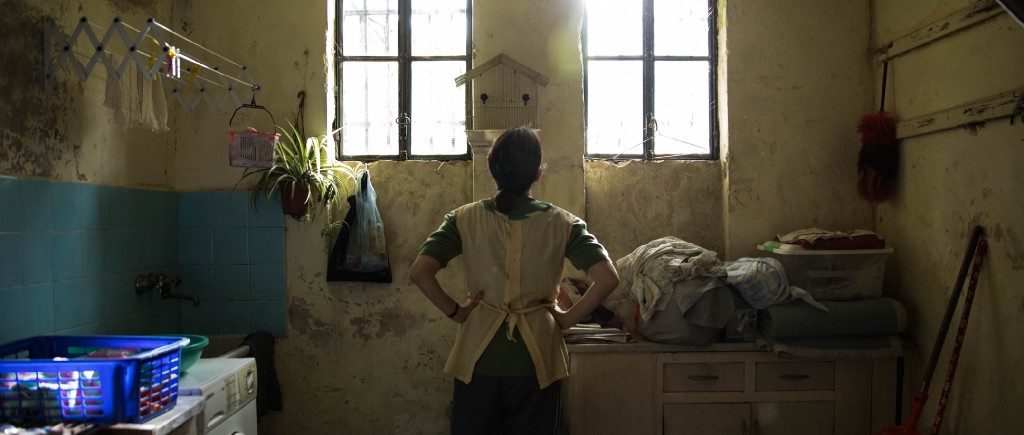Cecilia Atan’s documentary series “Madres de Plaza de Mayo, la Historia” was nominated for the International Emmy Awards. “The Sea,” her first short film, screened at the Cannes Short Film Corner in 2012. “The Desert Bride” is her first fiction feature film.
Valeria Pivato has worked as an assistant director, script supervisor, and casting director. In 2013, she won the Patagonik International Screenwriters Competition for “Before and After… and After Again.” “The Desert Bride” is also her first fiction feature film.
“The Desert Bride” (“La Novia del desierto”) will premiere at the 2017 Cannes Film Festival on May 25.
W&H: Describe the film for us in your own words.
CA&VP: “The Desert Bride” is the story of Teresa, a 54-year-old woman who has worked for decades as a live-in maid in Buenos Aires. When the family sells the house, she is forced to take a job in the distant town of San Juan. Although uncomfortable with traveling, she embarks on a journey through the desert.
During her first stop, in the land of the miraculous Saint Correa, she loses her bag with all her belongings. This unexpected incident leads her to cross paths with El Gringo, a traveling salesman and the only one who can help Teresa find her bag. What seemed like the end of her world will ultimately prove her salvation.
W&H: What drew you to this story?
CA&VP: “The Desert Bride’s” script was born about five years ago. We wanted to explore the feminine world from a particular perspective: a woman whose life changes suddenly, at an age when reinventing herself does not seem possible in the world of today.
Live-in maids in Latin America work decades for families, but they are certainly not part of them. Teresa, our protagonist, is a woman who has dedicated her life to caring for a family and has not taken care of herself. She spent years refugee in her routine and in everything that is known to her.
The abrupt change of circumstances forces her to take a leap that she wouldn’t otherwise; this is the beginning of a new life.
W&H: What do you want people to think about when they are leaving the theater?
CA&VP: We hope that the audience jumps into the story and makes this journey with Teresa, and that they apply the transformation of the character to their own lives. We want them to forget about the real world for a while and return to it at the end of the film with an inspired smile.
W&H: What was the biggest challenge in making the film?
CA&VP: The film’s production model was not easy. Some creative aspirations weren’t exactly real possibilities, but every circumstance that seemed an obstacle slowly became a fortress.
A film is a living work, and transforming limitation into value is an important key of all creative processes. Each experience is unique, and we imagine that the next one will offer new obstacles that will become new strengths.
W&H: How did you get your film funded? Share some insights into how you got the film made.
CA&VP: Because “The Desert Bride” was our first movie, it was not easy to get financing. We worked almost five years to complete the budget.
In 2015, we won the First Feature Film Fund from INCAA (The Argentinian National Institute of Cinema). Because our project is an organic co-production, as [Chilean actress] Paulina García is our main character, we also applied for and received support from the Chilean National Fund. Then, closer to the shooting, we received a very important push by the government of San Juan province, Argentina, where we shot 80 percent of the film.
But, it is important for us to note that our film is not only the result of official funds from Argentina and Chile. It was possible thanks to a lot of people who helped us make our dream come true.
W&H: What does it mean for you to have your film play at Cannes?
CA&VP: Being in the Un Certain Regard section at Cannes marks the beginning of a new stage. We see it as a beautiful privilege and a projection of our future directorial careers.
W&H: What’s the best and worst advice you’ve received?
CA&VP: The best advice came when we were discussing the film’s budget: “The worst movie is the one you haven’t made at all.”
We didn’t receive any terrible advice. From the beginning, we both tried to be as connected to the day-to-day process as possible. We wanted to make our own experience and learn lessons from inevitable obstacles.
W&H: What advice do you have for other female directors?
CA&VP: The advice we would give a female director is the same that we would give a male director: Despite the bustle of making a movie, try to be true to yourself and never lose sight of the heart of your story.
W&H: Name your favorite woman-directed film and why.
CA&VP: One of the films that really touched us a couple of decades ago was Jane Campion’s “The Piano.” We were surprised by the relationship between the two main characters, how they meet each other and become closer in spite of their language and different cultures. All filmic elements — framing, light, art, costume, and music — gather to work as a perfect setting for this fine and subtle story.
We are very excited that she will be part of this year’s festival.
W&H: There have been significant conversations over the last couple of years about increasing the amount of opportunities for women directors yet the numbers have not increased. Are you optimistic about the possibilities for change? Share any thoughts you might have on this topic.
CA&VP: The participation of women at Cannes this year is a clear example of the progress of women in the film industry. We are optimistic about it.
Day by day, roles that women occupy, both in front of and behind the camera, increase thanks to their tireless struggle.







